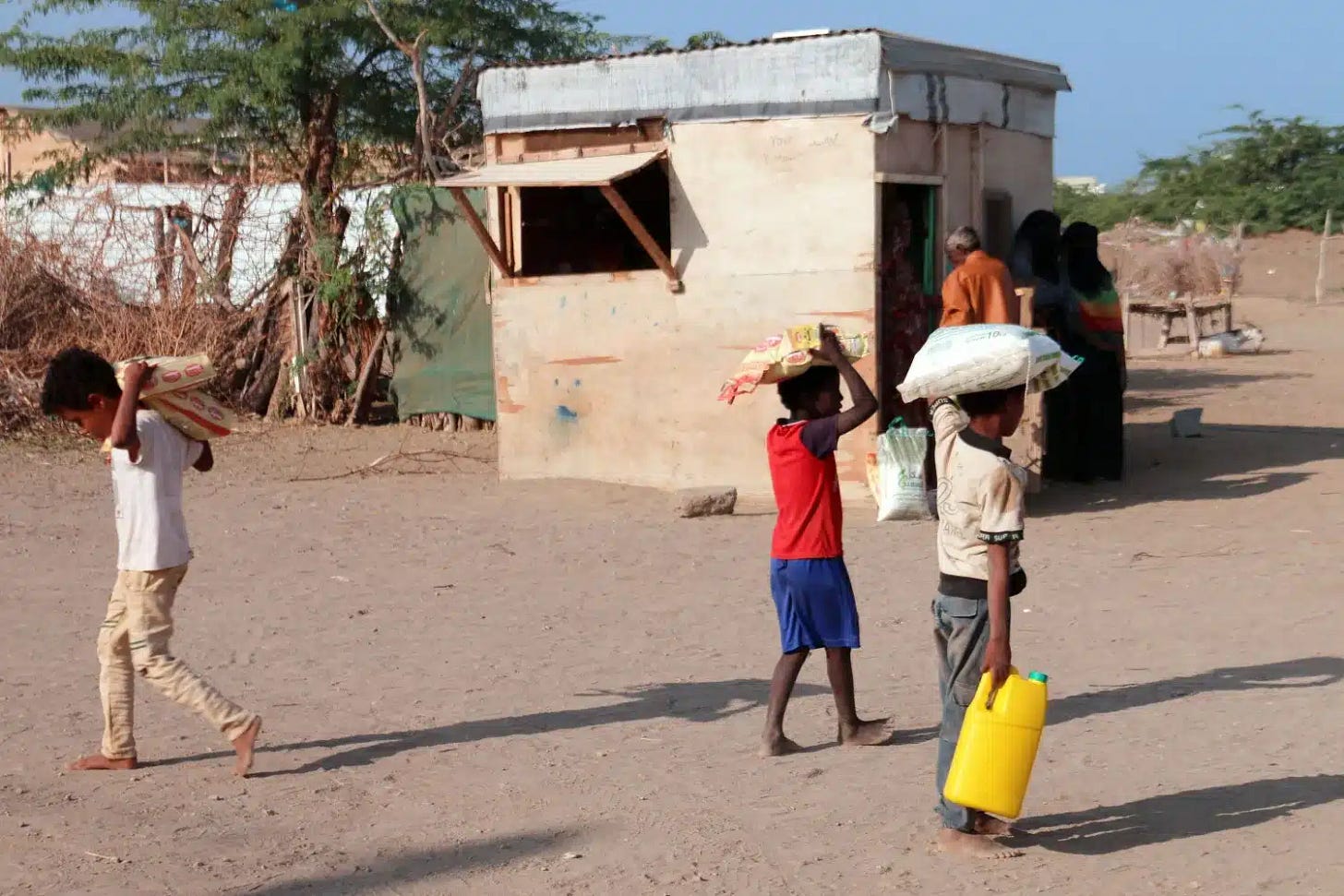As Yemen enters its eleventh year of war, the country faces a dire economic and humanitarian crisis. With millions relying on international humanitarian assistance to meet their basic needs, the ongoing conflict and policies—particularly those enacted by the Houthi militia—have made aid delivery not only difficult, but often impossible.
Soon after the Houthis seized control of Sanaa in September 2014, they began reshaping the humanitarian landscape by consolidating control over aid operations. They established the Supreme Council for Relief to manage assistance, later transferring these responsibilities to the Foreign Ministry of their unrecognized government.
By the end of 2024, the Houthis had succeeded in controlling the flow of international funding. A significant portion of humanitarian aid was redirected to support their military fronts and political ambitions. The group also reportedly used threats and detentions to pressure humanitarian organizations into appointing loyalists to leadership positions and aligning aid projects with their military-political agenda.
Umm Mariam, a 40-year-old vegetable vendor in Sanaa, works from 7 a.m. to 4 p.m. daily. Her modest income is the sole lifeline for her four children amid increasingly harsh living conditions.
She once relied heavily on aid from humanitarian organizations, but that support has drastically diminished. "Before the aid stopped, life was a little easier," she told Noon Post. "Now, I work harder and longer, but I still can't guarantee my children a dignified life. Even with all the hours I put in, I can’t meet their basic needs."
Shrinking Aid
Humanitarian affairs researcher Mohammed al-Muqrami said that Yemen’s humanitarian situation worsened significantly in the first quarter of 2025 due to global reductions in aid.
Al-Muqrami told Noon Post that a wave of Houthi-led kidnappings targeting international organization staff caused widespread disruptions. Many aid groups either scaled back operations or exited Yemen entirely out of fear, leading to a funding shortfall of over 50% compared to previous years.
In June 2025, UN Special Envoy Hans Grundberg called for the immediate release of UN staff arbitrarily detained by the Houthis. Some have been imprisoned since 2021, with 23 humanitarian workers reportedly held for over 1,000 days.
Washington Cuts Aid
In January 2025, President Donald Trump signed an executive order freezing U.S. foreign aid for 90 days to review program effectiveness and alignment with U.S. foreign policy. The order halted funding for foreign governments, NGOs, contractors, and international bodies—cutting about 83% of USAID programs, with remaining initiatives moved to the State Department.
Dr. Abdulqader al-Kharrraz, a prominent academic and head of the "We Will Not Stay Silent" campaign against aid corruption, told Noon Post that U.S. contributions dropped drastically to just $42 million—raising serious concerns over where the funds were going.
"The main reason for this drop is growing donor skepticism. Funds meant for the Yemeni people appear to be indirectly benefiting the Houthi militia instead," al-Kharraz said.
Humanitarian researcher Mohammed al-Muqrami noted that in 2024, the U.S. accounted for roughly half of Yemen’s total humanitarian aid—making its withdrawal especially devastating.
Humanitarian and Economic Fallout
As the internationally recognized Yemeni government struggles to implement development projects in liberated areas, international organizations continue to fund questionable initiatives in Houthi-controlled regions, worsening the humanitarian crisis.
Economist Mustafa Nasr told Noon Post that the Houthis have pursued a systematic strategy to dominate aid distribution, establishing affiliated entities to manage grants—often misappropriating or selling aid for profit.
"The Houthis not only control aid distribution, but they’ve also threatened and arrested humanitarian workers. Many organizations have had no choice but to leave Houthi-held areas, abandoning millions of people in desperate need," Nasr added.
The consequences have been dire, especially in governorates like Mahwit, Hajjah, and Amran. Health and education services have deteriorated rapidly, and disease outbreaks have become more common.
In 2025, the UN revised its aid plan for Yemen, reducing the funding target from $2.4 billion to $1.4 billion to assist 8.8 million people—highlighting a significant gap in resources.
Dr. al-Kharraz said that international aid flowing through private banks and exchange houses in both Sanaa and Aden is widening the exchange rate gap between Houthi and government-held areas. "These discrepancies are creating avenues for corruption, even within international organizations."
Support for Yemen has plummeted from $5 billion in 2018 to just $400 million in 2025.
A report from the UNHCR described Yemen as still suffering from one of the worst humanitarian crises in the world, with 18.2 million people—including 4.5 million internally displaced and over 60,000 refugees—urgently in need of aid.
Al-Muqrami said the situation is worse than ever. “More than 23 million civilians, mostly women and children, need urgent assistance. Yet only 8 million are being reached. The economic collapse, lack of essential services, hyperinflation, and currency depreciation have pushed Yemen to the brink of famine.”
Allegations of Collusion
International aid organizations have faced growing accusations of colluding with the Houthis despite the group’s human rights abuses and designation as a terrorist entity.
Dr. al-Kharraz argued that the Houthis tightened their grip on aid operations by transferring oversight to their foreign ministry in late 2024. "Even with international sanctions in place, these organizations continue working under Houthi supervision in Sanaa and have refused to relocate to Aden," he said.
He also alleged that a large share of humanitarian funding is funneled directly to the Houthis. “This money is not reaching civilians. It’s funding militias and prolonging conflict.”
Houthi Coercion
Rights activist Hani al-Aswadi said the Houthis have pressured aid agencies to appoint loyalists and steer projects in line with their military-political goals.
Local NGOs not aligned with the Houthis have been shut down, while aid has been diverted to support the militia’s war effort. Black markets for humanitarian goods, overseen by Houthi leaders, have proliferated.
Despite repeated warnings from rights organizations during international forums in Geneva, violations persist unchecked, undermining the effectiveness of humanitarian programs.
Al-Aswadi called on the international community to take firm steps to pressure the Houthis into halting these abuses and ensuring aid reaches those who need it most.



